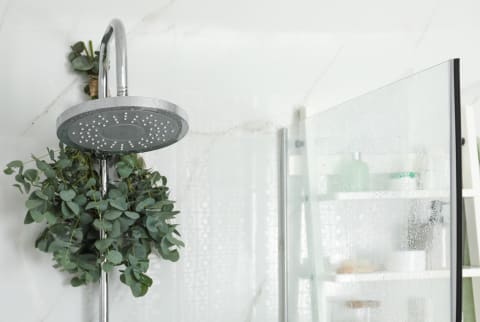How To Make Your Own Shower Bouquet For A Spa-Grade Luxury At Home


When you hear the phrase shower bouquet, you may picture an arrangement of loofahs, towels, or other bathroom-related gear. Or if you're a bit more familiar with the benefits of aromatic plants in your bathroom, maybe you envision eucalyptus branches hanging off the showerhead. The latter is a much closer guess—but consider shower bouquets the eucalyptus bundle 2.0.
We've seen these functional flower arrangements popping up online of late with a range of price points, but this is one home improvement project that may be better to DIY. See, creating your own shower bouquet will give you the freedom to choose specific plants based on the aroma and benefit you're after, be it enhancing relaxation or providing some natural energy stimulation. Below, we break down how to make these tiny luxuries at home.
Why do people hang eucalyptus in the shower in the first place?
You may be asking: Why put these plants in the shower rather than on your side table, kitchen counter, or…literally anywhere else? Well, as plant specialist Christine Buckley, author of Plant Magic: Herbalism in Real Life, previously explained to mbg: "Eucalyptus is high in volatile oils, which evaporate when exposed to the air. Hanging eucalyptus in the shower means we get the benefit of the volatile oils as the steam releases them from the leaves and holds them in the air around us." Essentially, when the plant interacts with the steam, it releases those potent essential oil droplets, creating a DIY diffuser of sorts.
How to make a shower bouquet.
What makes a shower bouquet different from your typical eucalyptus bundle is the blend of various herbs and flowers—hence bouquet. Sure, you can throw some eucalyptus in the mix, but a few other picks can make your shower assortment really sing. Here's how to create your own assortment:
- First up: Choose your flowers—see below for a few examples with their purported benefits.
- Before you place your bouquet in the shower, be sure to use a hammer, wine bottle, rolling pin—anything heavy that can roll with ease—to crush the leaves and release the aromas.
- Then tie your bundle together with your rope or twine of choice and hang it on your shower head! Yes, it's that simple.
Now, let's discuss a few plants you can add to your eucalyptus bundle to switch up the aromatic experience and reap some added benefits:
Lavender.
Especially if you shower in the evening, lavender is a great plant to include in your bouquet; while there are many benefits of lavender oil, it's perhaps most known for its sleep-enhancing properties. One study1 found that several whiffs of lavender oil before bed increased the percentage of deep sleep time in healthy men and women. This powerful plant oil can also help relieve stress2, making it a wonderful addition for a shower bouquet made for relaxation and an end-of-day cleanse.
Rosemary.
On the flip side, rosemary might be a great addition to a morning shower bouquet, as the essential oil can promote mental clarity (thanks to the invigorating scent) and has even been shown to support memory. In one 2017 study on 40 school-age children, the students in a room infused with rosemary oil scored five to seven points higher on a memory test.
Separate research on adults supports these findings, demonstrating that rosemary essential oil can boost cognitive performance3. Researchers believe this is because a compound in rosemary inhibits the breakdown of neurotransmitters responsible for encoding memories in the brain. Regardless, rosemary is a fantastic herb to include in your bundle if you're after a rejuvenating, brain-supporting benefit.
Peppermint.
If you find yourself feeling sluggish in the morning and crave a little pick-me-up, a few peppermint sprigs may be a good option for your bouquet—experts love peppermint essential oil primarily because of its stimulating impact on the senses.
Like rosemary, peppermint oil is beloved for supporting memory, focus, concentration, and mental performance. In one study on 24 participants4, those who ingested a higher concentration of peppermint essential oil reported less mental fatigue after cognitively demanding tasks. If you shower in the morning, consider incorporating peppermint into your shower bouquet to add a natural aromatic energy boost.
Chamomile.
Perhaps you relax before bed by sipping on a piping-hot mug of chamomile tea—you can place this pretty flower in your shower bouquet for similar benefits. Inhalation of vaporized chamomile, whether that be in an essential oil diffuser or in your shower, may help relieve stressful feelings and promote those feel-good emotions5.
The takeaway.
At the end of the day, your self-care routine is yours to experiment with. Whether you're looking for a more spa-like experience or seek the benefits of aromatherapy, shower bouquets are a versatile (and beautiful!) way to partake. Just remember: The benefits of these bouquets come from inhaling the plants' essential oils, so be sure to switch out your shower bouquet once the fragrance dissipates.

Hannah Frye is the Assistant Beauty & Health Editor at mindbodygreen. She has a B.S. in journalism and a minor in women’s, gender, and queer studies from California Polytechnic State University, San Luis Obispo. Hannah has written across lifestyle sections including skin care, women’s health, mental health, sustainability, social media trends, and more. She previously interned for Almost 30, a top-rated health and wellness podcast. In her current role, Hannah reports on the latest beauty trends and innovations, women’s health research, brain health news, and plenty more.